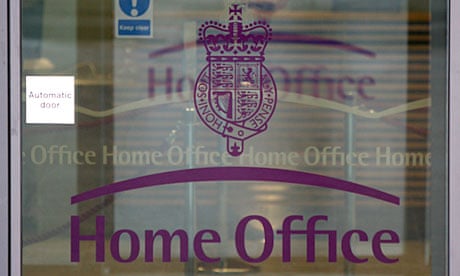A group of computer hackers have claimed responsibility for taking down the Home Office website, apparently in protest against government extradition and surveillance policies.
Internet users were unable to fully access the department's homepage for several hours on Saturday night as a message on the site said the page was currently unavailable "due to a high volume of traffic".
One message on Twitter claiming to be from Anonymous said the action was "for your draconian surveillance proposals", while another said it was in protest at the UK's extradition treaty with the US.
It read: "You should not give UK citizens to foreign countries without evidence. If an offence happened in the UK, so should the trial."
Another tweet claiming to be from members said the action had been taken in "protest of the potential extradition of Gary McKinnon, Christopher Harold Tappin & Richard O'Dwyer".
There were also claims on Twitter that the group had disrupted the websites of the Ministry of Justice and No 10.
One message said: "#Anonymous launched a cyberattack on http://www.number10.gov.uk, http://www.homeoffice.gov.uk & http://www.justice.gov.uk resulting in multiple TANGO DOWNS."
All three government websites are now fully operational.
After the Home Office website was disrupted, the department said it had been "aware of some reports that the Home Office website may be the subject of an online protest" and had "put all potential measures in place".
It is believed the site may have been hit by a denial-of-service attack, which prevents a website from functioning properly, sometimes by swamping it with more traffic than it can handle.
Last week it emerged that the government was planning a huge expansion of its powers to monitor the email exchanges and website visits of every person in the UK.
Under legislation expected in next month's Queen's speech, internet companies will be instructed to install hardware enabling GCHQ to examine on demand any phone call made, text message and email sent and website accessed, in real time without a warrant.
Ministers have faced a backlash over the plans, with senior MPs from both coalition parties, as well as civil liberties groups, lining up to denounce it. The move has been condemned by opponents as an unnecessary extension of the state's powers to "snoop" on its citizens.
Meanwhile, the Commons home affairs select committee has called for an overhaul of the extradition arrangements between the UK and the US to restore "public faith". Many critics believe it is easier to extradite a British citizen to the US than vice versa.
Tappin, 65, a retired Kent businessman, is being held in jail in New Mexico while he awaits trial on arms dealing charges after being extradited last month.
Student Richard O'Dwyer, 23, of Chesterfield, is also fighting extradition after being accused of breaking American copyright laws by using his computer in the UK.
Gary McKinnon, 46, from Wood Green, north London, is still waiting to hear whether he will be extradited over charges he hacked into US military computers 10 years ago.
Anonymous has become increasingly politicised amid a global clampdown on music piracy and the international controversy over WikiLeaks.
Authorities in Europe, North America and elsewhere have made dozens of arrests, and Anonymous has increasingly attacked law enforcement, military and intelligence-linked targets in retaliation.
One of Anonymous's most spectacular coups was secretly recording a conference call between US and British cyber-investigators tasked with bringing the group to justice.
The collective has no real membership structure, with hackers, activists, and supporters able to claim allegiance to its freewheeling principles at their convenience.
